Communications and Marketing
The year 2022 of Hochschule Bonn-Rhein-Sieg
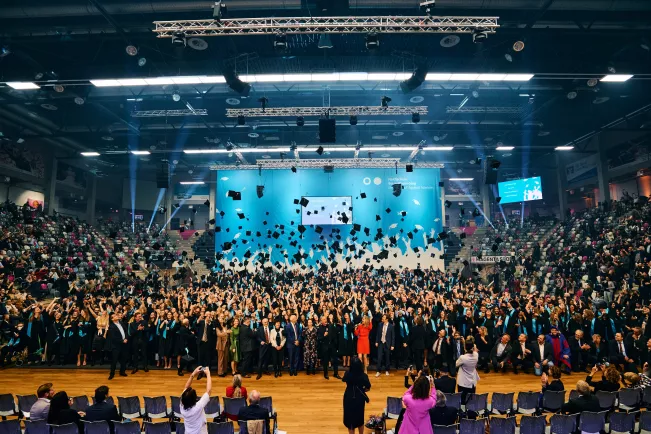
This year, Hochschule Bonn-Rhein-Sieg celebrated an event that can hardly be overestimated in its importance for universities of applied sciences (HAW): On 17 November, North Rhine-Westphalia's Minister of Science Ina Brandes awarded the Promotionskolleg (doctoral college) NRW the right to confer doctoral degrees. This means that the doctoral college, a joint academic institution of the HAW, can now independently conduct doctoral studies and award the doctorate. The joy at the Hochschule Bonn-Rhein-Sieg, which had set the course very early on to make doctorates possible for its students, has been accordingly great.
University President Hartmut Ihne therefore spoke of a milestone for the HAW and a consistent step in terms of science policy: "This will give applied research a significant boost and further strengthen NRW as a science state overall." With the independent right to award doctorates, HAW's excellent research work will be recognised and the quality in the development of young academics will be enhanced. "We have been fighting for this step for a very long time," said Ihne. The Graduate Institute (GI) was founded at the H-BRS on 1 January 2010. The aim was to support doctoral students in their doctoral projects. Previously, doctorates could only be completed in cooperation with a university. This remains possible, but the necessity no longer applies. Currently, about 120 doctoral projects are running at the H-BRS.
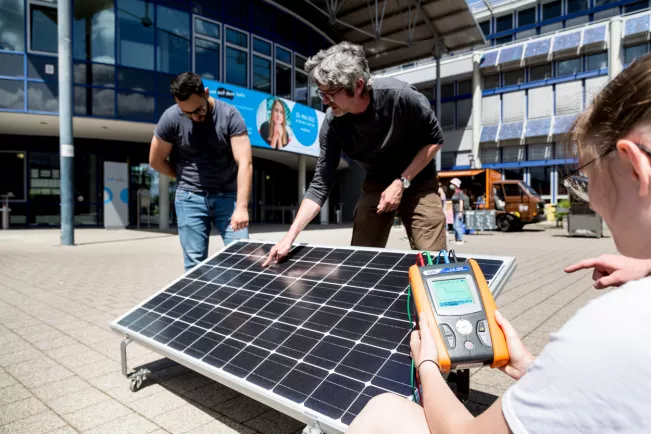
All Bachelor's and Master's graduates also had reason to celebrate at H-BRS' big graduation ceremony on 22 October in the Telekom Dome. The university said goodbye to 900 graduates. A total of around 4000 guests celebrated at the event - more than ever before. The graduating classes of the past three academic years were invited, as the traditional graduation ceremony could not take place in attendance for two years due to the Corona pandemic. The most impressive picture of the evening was the traditional hat toss: All graduates gathered on the huge stage and threw their Bachelor's and Master's hats into the air at the same time.
In June, the university's executive board adopted a sustainability strategy that gives new weight to the topic of sustainability - based on numerous projects and initiatives in this field. "Our aspiration is to play a leading role in the region when it comes to sustainability," explained University President Hartmut Ihne at the presentation of the 16-page document. The self-chosen goals are diverse and ambitious: The CO2-neutral campus is just as much a part of it as new sustainability study programmes or research for the expansion of renewable energies. The topic of sustainability is also to be taught in an increasingly interdisciplinary and cross-departmental manner. The university builds on the support of existing regional and supra-regional networks, such as the Sustainability Alliance of Universities of Applied Sciences in NRW or the Bonn Alliance for Sustainability Research.
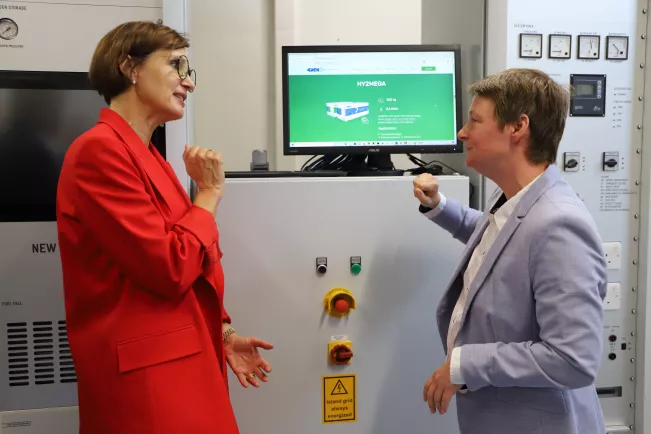
"Finally back in attendance" applied to the vast majority of all events at the H-BRS since the beginning of the year. In the winter semester of 2021/22, the university had already returned to a high proportion of face-to-face teaching. At the beginning of April, all restrictions and requirements such as 3G checks were dropped. Since then, everyday university life has returned to normal: After two years of the Corona pandemic, life has returned to lecture halls, seminar rooms, laboratories and dining hall. This has also allowed the various interdisciplinary student activities to fully develop again: In the maintenance of the campus garden, the operation of an electric racing car or in the Finance Club. And of course, the student committees such as the AStA and the student councils did their part to make campus life flourish again.
In August, Federal Research Minister Bettina Stark-Watzinger (FDP) visited the H-BRS. She was particularly interested in research on hydrogen, which is expected to play a key role in the energy transition. The H-BRS is involved in two of three hydrogen lead projects funded by the Federal Ministry of Education and Research (BMBF). The new North Rhine-Westphalian Science Minister Ina Brandes, who visited the university in September, also got an idea of the hydrogen projects at the H-BRS. She also informed herself extensively about the work of the Biometrics Evaluation Centre, which the university has set up together with the Federal Office for Information Security (BSI). Biometric systems are becoming increasingly important in the authentication of users - from border control to payment via smartphone.
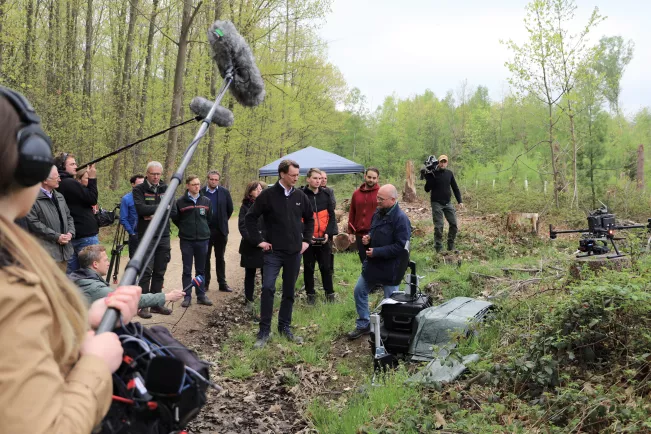
In 2022, the H-BRS has continued to research promising topics, expanded its range of courses, set up new laboratories and appointed more professors. In line with its profile, the topics of sustainability, digitisation and security are the focus of research at the H-BRS. The "Garrulus" project, for example, attracted nationwide attention in 2022. In this project, scientists are working on drones that will survey damaged forest areas and also spread new seeds for reforestation. The research projects on plastics and microplastics are also concerned with environmental pollution. Scientists at H-BRS are developing methods to minimise energy consumption and material in the production of plastic packaging. In 2022, the university succeeded in filling the vacant research area of medical tourism again. The new head, Mariam Asefi, has already advanced to become a sought-after expert. With this research area, the H-BRS has a unique selling point in the German university landscape.
The H-BRS took a new approach to communicating research results with the exhibition "Future Food". In cooperation with the Museum Koenig, the digital exhibition shows the role insects can play in the human diet. A collection of recipes encourages visitors to try their hand at cooking.
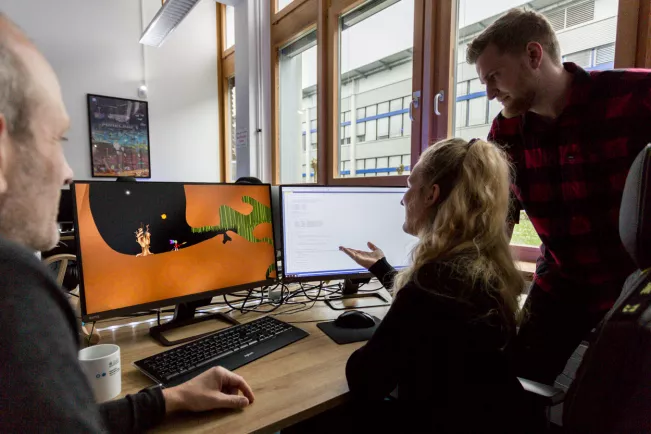
The H-BRS created a new type of facility at the beginning of the year with the Studio for Computer Games. In the studio, students analyse current games and test their own ideas. The matching Bachelor's and Master's degree programmes have existed at the H-BRS for some time, for the advanced game developers it is called "Visual Computing and Games Technology". The Donors' Association for the Promotion of Sciences and Humanities in Germany was so impressed by the design of the Game Studio that it awarded it the "University Pearl of the Month" in July.
The university library in Sankt Augustin, which is also the district library, has been presenting itself in a new look since September after a lengthy renovation. The learning space has been enlarged, the technical equipment has been improved and there is new seating for individual and group work. The library has entered a new era of research with the introduction of Bib-Discover. The system replaces the previous library catalogue. It makes it possible to search for information in the entire collection in just one step.
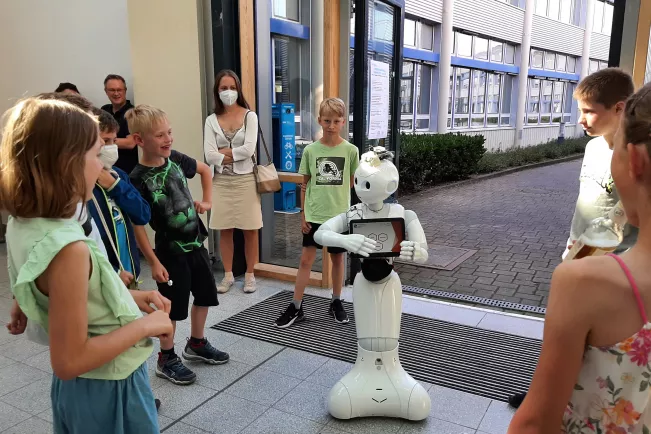
The consequences of the flooding of the Rheinbach Campus in July last year continued to occupy the H-BRS in 2022. However, the signs have changed compared to 2021. Immediately after the natural disaster, the focus was on finding replacement rooms and organising the continuation of teaching, whereas in the current year, reconstruction was on the agenda. The first successes are visible: three buildings on campus are back in operation, and other buildings are being repaired with the help of a lead project planner.
In 2022, H-BRS returned to its usual wealth of public events, also thanks to the freedoms it had regained. The eighth edition of the Rhine-Sieg Children's University was very popular with junior scientists. In four events, children from eight to twelve years of age explored current research questions in the fields of environment and climate protection. The university organised the Children's University 2022 on its own for the first time. One of the largest events of its kind in Europe is FrOSCon, which was hosted by the H-BRS over two days in August. At the conference with integrated trade fair, everything revolved around open source software. There was a lot to see and try out at the Mobility Day in September. A symposium at the university complemented the diverse offers of the activity area, which the car park on Grantham-Allee in Sankt Augustin had been transformed into. The conference "Ethics of Transformation" in October, to which the Centre for Ethics and Responsibility (ZEV) of the university had invited to the Uniclub Bonn, attracted a lot of attention. Experts from science and society - including the environmental scientist Ernst Ulrich von Weizsäcker - discussed how a transformation of society towards more justice, climate protection and biodiversity can succeed.
In November, the Hochschule Bonn-Rhein-Sieg was once again bustling with people: 148 companies presented themselves over two days at the Company Day, and around 4,000 visitors came to find out about career opportunities. The Company Day is the largest career fair in the Bonn/Rhine-Sieg region in terms of exhibitors. In addition, the library resumed the popular reading series "Guest on the Sofa" after a two-year break from Corona.
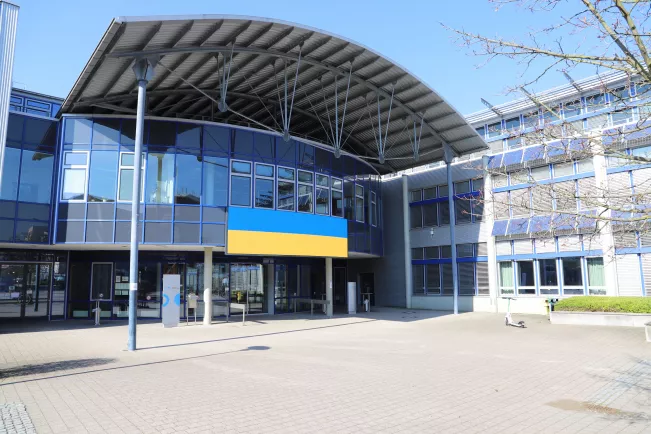
The Russian war of aggression in Ukraine also kept the university busy. The H-BRS has taken in students from Ukraine, set up an emergency fund and offered two Ukrainian scientists short-term employment in research projects. Currently, the employees are collecting money and donations in kind for an aid transport for the partner university Chernihiv Polytechnic National University.
"The year now drawing to a close has challenged the university community in an unprecedented way," says university president Hartmut Ihne. "We have taken on the repair of the Rheinbach campus with a lot of vigour and have made great progress in the process. At the same time, we had to experience that neither peace in Europe nor our energy supply can be taken for granted. Once again it has been shown that we must not abate in our work for peaceful coexistence and a healthy environment."
Press images





